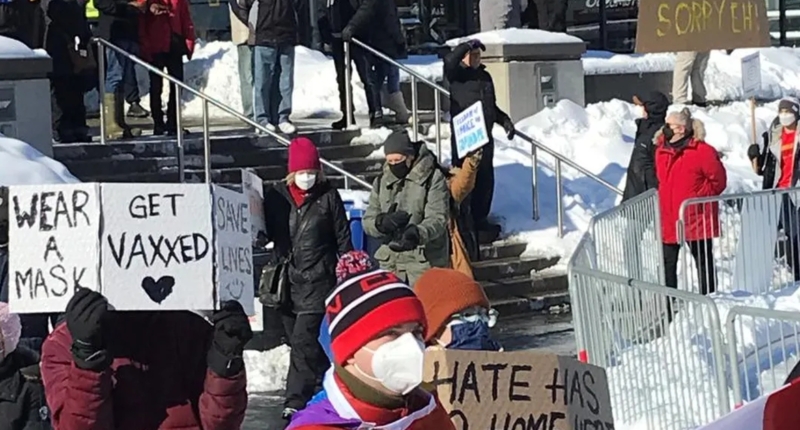The COVID-19 pandemic has highlighted the need for effective public communication strategies and vaccine equity. Social media platforms have played a significant role in spreading misinformation about COVID-19 and anti-vaccine sentiments, making it difficult to counter the spread of health misinformation. The importance of public communication strategies that provide science-based, factual information has been emphasized, and the public must be provided with reliable information online. Previous recommendations to stockpile medical supplies in preparation for future pandemics were ignored, highlighting the need for preparedness and the difficulty of heeding lessons from past pandemics. Furthermore, the pandemic has generated debates around public health measures and revealed the need for effective communication to promote vaccination and encourage compliance with public health guidelines. Vaccination efforts should prioritize the most vulnerable populations, such as seniors in long-term care homes and seniors living in the community, and vaccine equity must be achieved by getting vaccines to low-income, Indigenous, and immigrant communities that have lagged in vaccine uptake.
The COVID-19 pandemic has led to an unprecedented information war, with social media disinformation being blamed for thousands of deaths. Shana MacDonald, a researcher at the University of Waterloo, believes that stronger regulation is needed to counter the spread of health misinformation on social media platforms. She is supported by a report from the Council of Canadian Academies, which found that vaccine hesitancy caused by misinformation on social media led to thousands of deaths in Canada and an extra $300 million in healthcare costs in 2021 alone. MacDonald argues that the government needs to support the production and distribution of science-based, factual information to counter the spread of misinformation.
According to MacDonald, science communication is facing an uphill battle as the spread of misinformation has been more successful on social media than accurate, evidence-based information. Public trust has been eroded, and MacDonald suggests that all levels of government and public health agencies need communications experts steeped in the science of vaccines, pandemics, and medical research to provide clear messaging.
Statistics Canada reports that deaths due to COVID-19 have been increasing, not decreasing. In 2020, there were 16,151 COVID deaths in Canada, while in 2021, there were 14,606 deaths. In 2022, the number of deaths increased to 19,034. In Waterloo Region, COVID has killed 515 people since the start of the pandemic, with fewer deaths but far more hospitalizations recorded than in other regions.
While over 90% of Canadians received their first two vaccine shots in 2021, far fewer have been diligent about getting booster shots to protect against COVID-19 variants. MacDonald believes this is due to messaging fatigue, and winning the communications battle for booster shots may prove challenging. MacDonald argues that in addition to regulating social media platforms and private messaging apps, Ottawa needs to support the production and distribution of science-based, factual information to counter the spread of misinformation.
Shana MacDonald, a researcher at the University of Waterloo, believes that proper communication regarding booster shots is critical in the fight against COVID-19, but this messaging has not been effectively conveyed to the public. MacDonald argues that the spread of misinformation and anti-vaccine sentiments on social media platforms has played a major role in the failure to promote vaccination and encourage booster shots. The COVID-19 pandemic has highlighted the importance of public communication strategies, and MacDonald stresses that science-based, factual information must be provided online and supported by stronger content moderation to counter the spread of health misinformation.
Aimée Morrison, a UW associate professor of English who specializes in technology and social media, argues that pandemics present unique challenges when it comes to public communication and preparedness. While previous recommendations to stockpile medical supplies in preparation for future pandemics were ignored, Morrison notes that pandemics have historically generated debates around quarantines, shutdowns, and travel restrictions. The role of social media in spreading misinformation is a newer phenomenon, and Morrison believes that public institutions must do a better job of meeting the public’s information and communication needs online.
Jennifer Whitson, a UW sociologist, emphasizes the need for effective pandemic health measures that can address noncompliance. Examples of such measures include COVID tracking apps and mask mandates, which have faced resistance due to concerns about privacy and personal liberty. Whitson points out that the tracking app was discontinued due to low adoption rates, while mask mandates are often ignored despite being recommended by Ontario’s chief medical officer of health. The COVID-19 pandemic has thus highlighted the need for effective public communication strategies and social problem-solving skills.
Morrison argues that the spread of misinformation and anti-vaccine sentiments on social media platforms is a major issue that must be addressed. Rumors and conspiracy theories can circulate rapidly in the absence of reliable information, and Morrison stresses the importance of providing credible information to replace false claims. However, the algorithm-driven nature of social media makes it difficult to control the spread of misinformation. Morrison believes that critical thinking and information literacy must be taught to improve users’ abilities to assess the reliability of information online.
The COVID-19 pandemic has also highlighted the importance of preparedness and public communication strategies. The failure to follow previous recommendations to stockpile medical supplies highlights the difficulty of heeding lessons from past pandemics. Furthermore, the pandemic has generated debates around public health measures and revealed the need for effective communication to promote vaccination and encourage compliance with public health guidelines.
Zahid Butt, an infectious disease expert at UW’s School of Public Health, believes that public health agencies should have prioritized the most vulnerable populations when the COVID-19 vaccine first became available. Specifically, Butt argues that seniors in long-term care homes and seniors living in the community should have been the primary focus of vaccination efforts, as vaccinating this group could have prevented severe disease and death. Additionally, Butt emphasizes the importance of vaccine equity and getting vaccines to low-income, Indigenous, and immigrant communities that have lagged in vaccine uptake.
Don’t miss interesting posts on Famousbio









